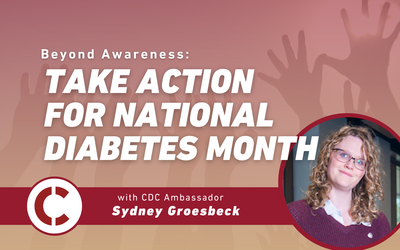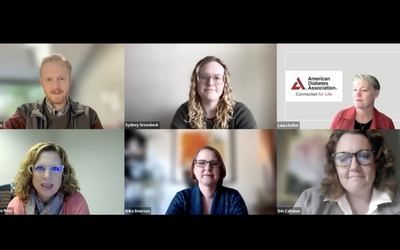
My journey between diagnosis of type 1 diabetes and deciding to engage in advocacy work was short. My experience with this disease – the good, the bad, and the ugly – inspired me to speak up on behalf of myself and chronic disease patients like me.
Type 1 Diabetes is an autoimmune disease that affects the body’s ability to produce insulin, where Type 2 Diabetes limits the body’s ability to use insulin.

This causes too much glucose to remain in your blood. Over time, high blood glucose levels can damage the small blood vessels in the kidneys, among other serious health complications. Type 1 diabetics must use insulin to lower their blood sugar, while Type 2 diabetics can use a variety of treatment options including oral medication, lifestyle changes, and sometimes insulin. There are additional forms of diabetes, like gestational diabetes in pregnant women, and even kinds that we’re continuing to learn more about: What some call “type 1.5” – or latent autoimmune diabetes in adults (LADA).
November is our nation’s annual observance of National Diabetes Awareness Month. I was so pleased that the Chronic Disease Coalition hosted a conversation on “Demystifying Diabetes” earlier this week, because the resources and experiences shared by all the panelists will be so useful in our upcoming advocacy work.

The panel – many of them diabetics themselves – focused on the need for systemic change in the way we address overall health in the United States. Factors like housing, safe neighborhoods, food deserts, etc. all impact our vulnerability to some types of diabetes or diabetic complications by limiting nutrition and exercise options. And of course, these issues disproportionately impact communities of color and low-income Americans. These challenges, alongside difficulties accessing affordable supplies and medications, can make diabetes management a struggle.
We also talked about the need to destigmatize diabetes. Every day can be different for diabetics— there are over 42 factors that impact blood glucose levels! We need to make conscientious efforts to change the way we talk about diabetes in public and private spaces, from comments about a person’s dietary habits to assumptions about treatment plans.
While awareness months are key to smart and effective advocacy, we have an opportunity this coming November to go beyond just a quick social media post. We can commit to taking action on behalf of the 37 million Americans with diabetes (and the 96 million with pre-diabetes).
In that spirit, I’m sharing some resources that we discussed at Chronic University for all chronic disease patients to explore.
End the stigma by participating in a conversation hosted by diaTribe.
Read stories about the experiences of T1 diabetics around the globe and download an Advocacy Toolkit at T1 International
Sign up to become a Diabetes Patient Advocacy Coalition Champion.
Join me and sign up to be an ambassador with the Chronic Disease Coalition.
Ask your congressional representatives to support the Treat and Reduce Obesity Act.
Share these National Diabetes Month resources from the National Institute of Diabetes and Digestive and Kidney Diseases.
If you’re like me, and the line between diagnosis and activism is short and direct, take a few minutes to act and join the diabetes conversation this November.